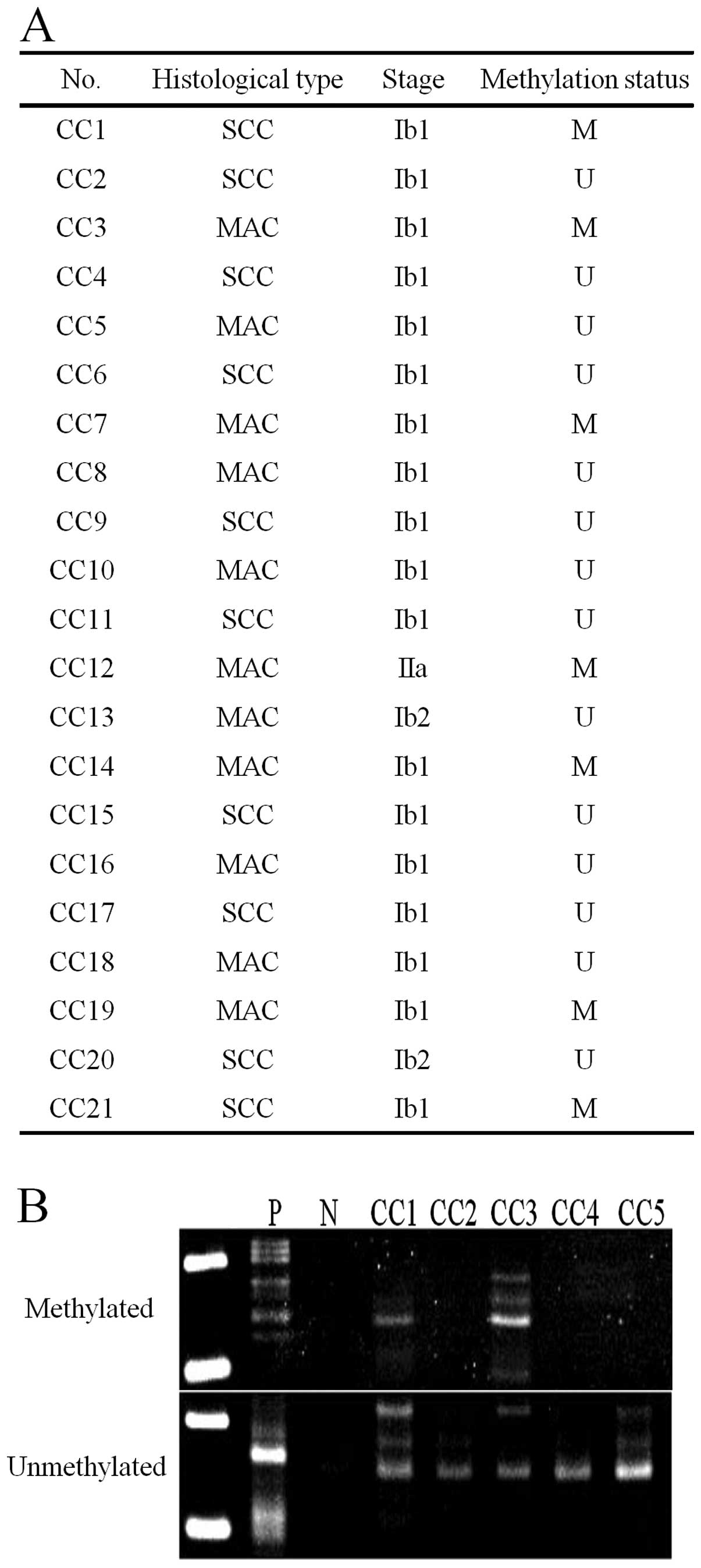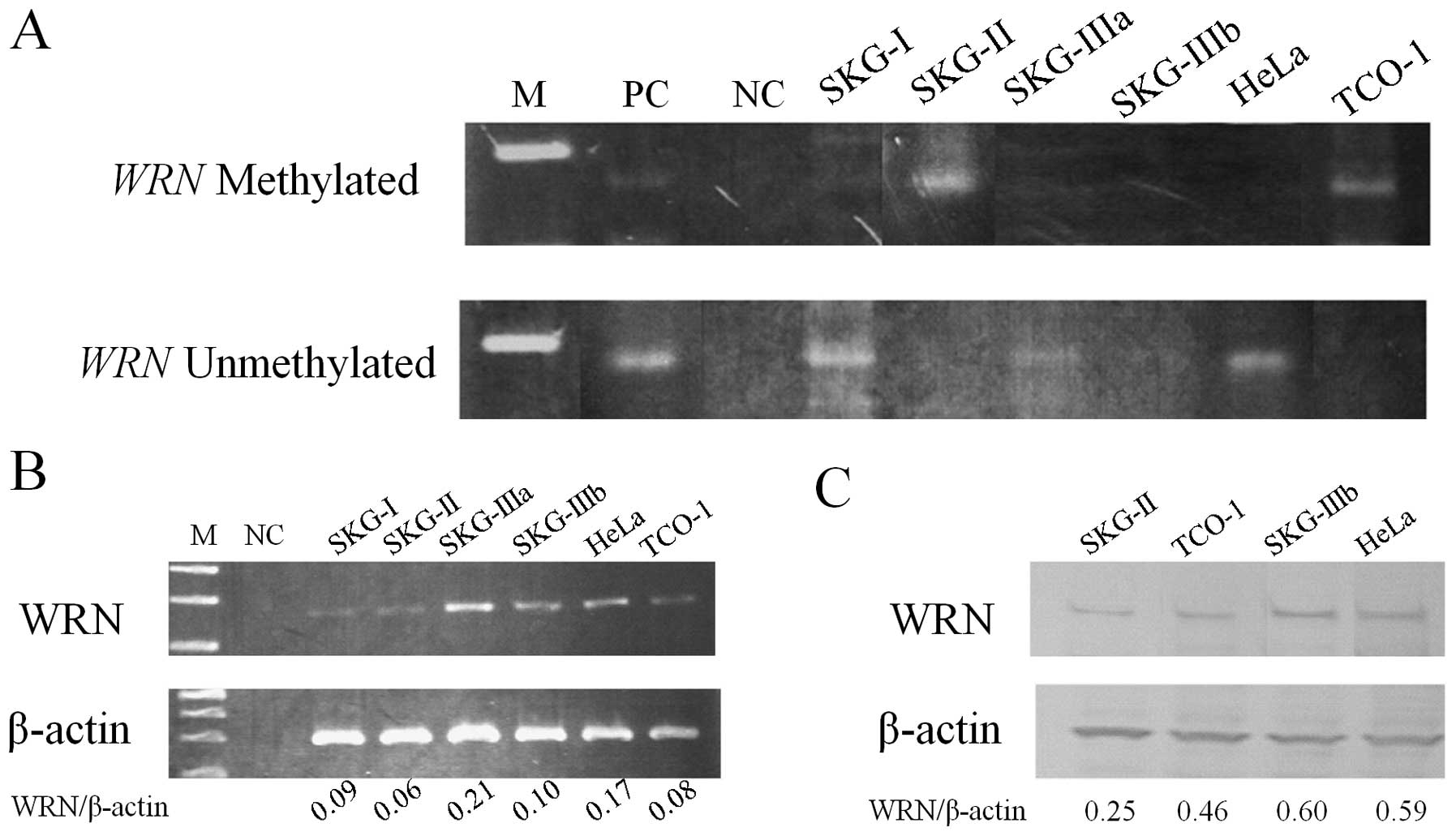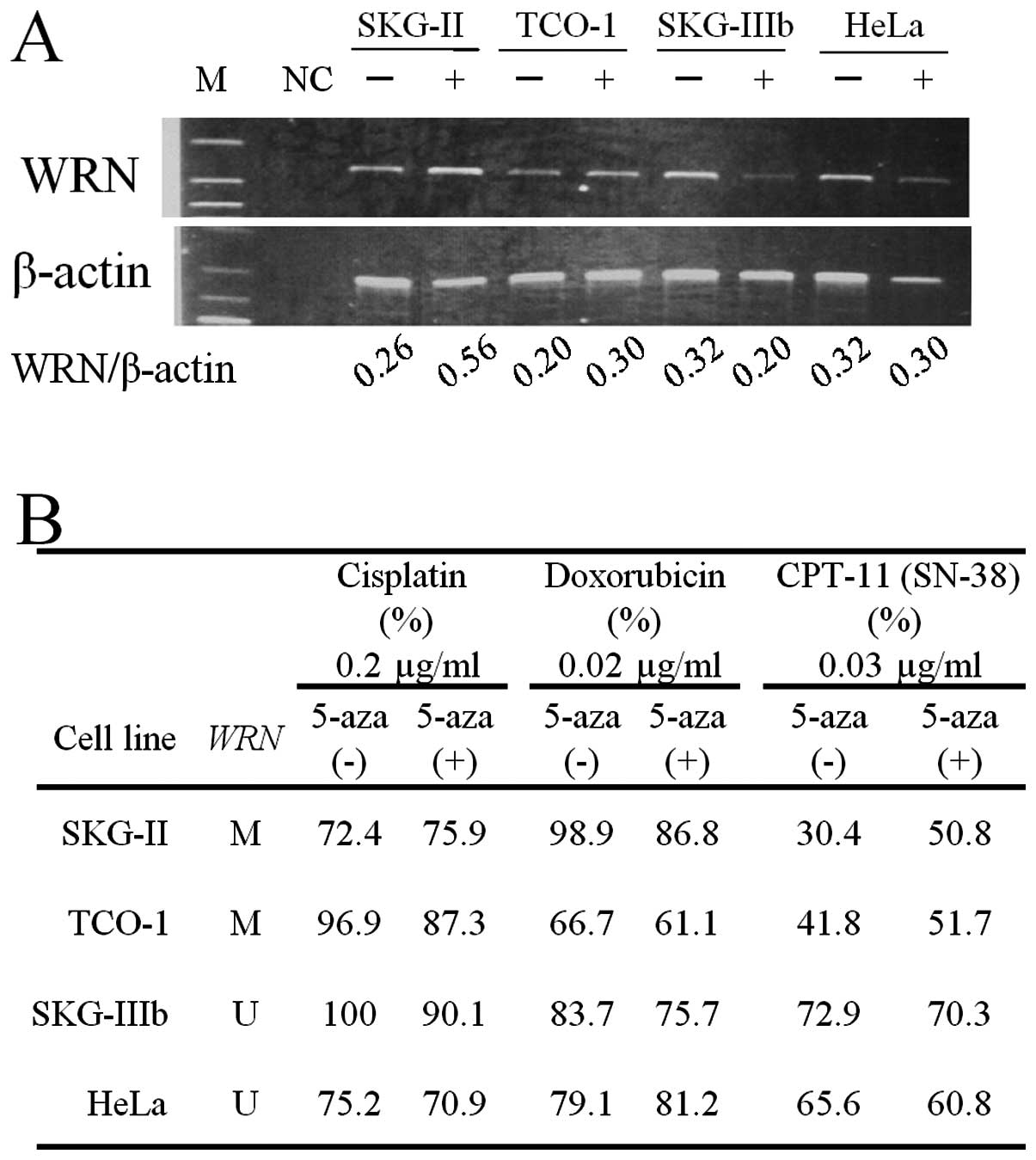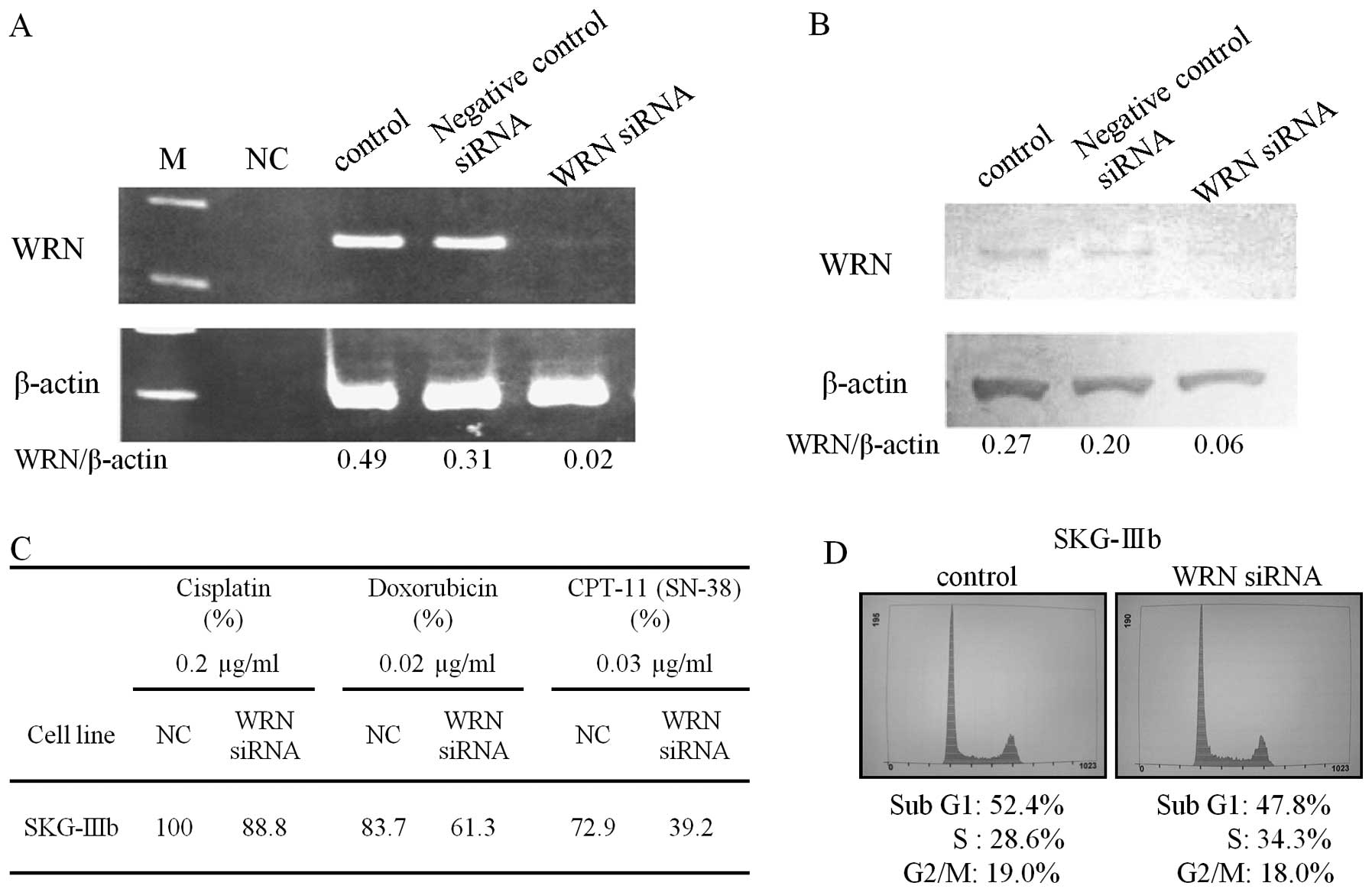|
1
|
Jemal A, Siegel R, Xu J and Ward E: Cancer
Statistics, 2010. CA Cancer J Clin. 60:277–300. 2010. View Article : Google Scholar
|
|
2
|
Forouzanfar MH, Foreman KJ, Delossantos
AM, et al: Breast and cervical cancer in 187 countries between 1980
and 2010: a systematic analysis. Lancet. 378:1461–1484. 2011.
View Article : Google Scholar : PubMed/NCBI
|
|
3
|
zur Hausen H: Papillomaviruses in
anogenital cancer as a model to understand the role of viruses in
human cancers. Cancer Res. 49:4677–4681. 1989.PubMed/NCBI
|
|
4
|
Munoz N, Bosch FX, de Sanjosé S, et al:
Epidemiologic classification of human papillomavirus types
associated with cervical cancer. N Engl J Med. 348:518–527. 2003.
View Article : Google Scholar : PubMed/NCBI
|
|
5
|
zur Hausen H: Papillomaviruses and cancer:
from basic studies to clinical application. Nat Rev Cancer.
2:342–350. 2002.PubMed/NCBI
|
|
6
|
Jones PA and Laird PW: Cancer epigenetics
comes of age. Nat Genet. 21:163–167. 1999. View Article : Google Scholar : PubMed/NCBI
|
|
7
|
Baylin SB and Herman JG: DNA
hypermethylation in tumorigenesis: epigenetics joins genetics.
Trends Genet. 16:168–174. 2000. View Article : Google Scholar : PubMed/NCBI
|
|
8
|
Esteller M: Epigenetic gene silencing in
cancer: the DNA hypermethylome. Hum Mol Genet. 16:50–59. 2007.
View Article : Google Scholar
|
|
9
|
Virmani AK, Muller C, Rathi A,
Zoechbauer-Mueller S, Mathis M and Gazdar AF: Aberrant methylation
during cervical carcinogenesis. Clin Cancer Res. 7:584–589.
2001.PubMed/NCBI
|
|
10
|
Wong Y, Chung TK, Cheung T, et al:
Methylation of p16INK4A in primary gynecologic
malignancy. Cancer Lett. 136:231–235. 1999.PubMed/NCBI
|
|
11
|
Dong SM, Kim H-S, Rha S-H and Sidransky D:
Promoter hypermethylation of multiple genes in carcinoma of the
uterine cervix. Clin Cancer Res. 7:1982–1986. 2001.PubMed/NCBI
|
|
12
|
Kuzmin I, Liu L, Dammann R, et al:
Inactivation of RAS association domain family 1A gene in cervical
carcinomas and the role of human papillomavirus infection. Cancer
Res. 63:1888–1893. 2003.PubMed/NCBI
|
|
13
|
Agrelo R, Cheng W-H, Setien F, et al:
Epigenetic inactivation of the premature aging Werner syndrome gene
in human cancer. Proc Natl Acad Sci USA. 103:8822–8827. 2006.
View Article : Google Scholar : PubMed/NCBI
|
|
14
|
Yu CE, Oshima J, Wijsman EM, et al:
Mutations in the consensus helicase domains of the Werner syndrome
gene. Werner’s Syndrome Collaborative Group. Am J Hum Genet.
60:330–341. 1997.PubMed/NCBI
|
|
15
|
Muftuoglu M, Oshima J, Kobbe C, Cheng W-H,
Leistritz DF and Bohr VA: The clinical characteristics of Werner
syndrome: molecular and biochemical diagnosis. Hum Genet.
124:369–377. 2008. View Article : Google Scholar : PubMed/NCBI
|
|
16
|
Goto M, Miller RW, Ishikawa Y and Sugano
H: Excess of rare cancers in Werner syndrome (adult progeria).
Cancer Epidemiol Biomarkers Prev. 5:239–246. 1996.PubMed/NCBI
|
|
17
|
Epstein CJ, Martin GM, Schultz AL and
Motulsky AG: Werner’s syndrome a review of its symptomatology,
natural history, pathologic features, genetics and relationship to
the natural aging process. Medicine. 45:177–221. 1966.
|
|
18
|
Huang S, Lee L, Hanson NB, et al: The
spectrum of WRN mutations in Werner syndrome patients. Hum Mutat.
27:558–567. 2006. View Article : Google Scholar
|
|
19
|
Shaheen AC, Malcolm CC, Neil RJC, et al:
Two novel regions of interstitial deletion on chromosome 8p in
colorectal cancer. Oncogene. 18:657–665. 1999. View Article : Google Scholar : PubMed/NCBI
|
|
20
|
Armes JE, Hammet F, de Silva M, et al:
Candidate tumor-suppressor genes on chromosome arm 8p in
early-onset and high-grade breast cancers. Oncogene. 23:5697–5702.
2004. View Article : Google Scholar : PubMed/NCBI
|
|
21
|
Futami K, Takagi M, Shimamoto A, Sugimoto
M and Furuichi Y: Increased chemotherapeutic activity of
camptothecin in cancer cells by siRNA-induced silencing of WRN
helicase. Biol Pharm Bull. 30:1958–1961. 2007. View Article : Google Scholar : PubMed/NCBI
|
|
22
|
Hsiang YH, Hertzberg R, Hecht S and Liu
LF: Camptothecin induces protein-linked DNA breaks via mammalian
DNA topoisomerase I. J Biol Chem. 260:14873–14878. 1985.PubMed/NCBI
|
|
23
|
Hsiang YH, Lihou MG and Liu LF: Arrest of
replication forks by drug-stabilized topoisomerase I-DNA cleavable
complexes as a mechanism of cell killing by camptothecin. Cancer
Res. 49:5077–5082. 1989.
|
|
24
|
Thigpen T: The role of chemotherapy in the
management of carcinoma of the cervix. Cancer J. 9:425–432. 2003.
View Article : Google Scholar : PubMed/NCBI
|
|
25
|
Takeuchi S, Dobashi K, Fujimoto S, et al:
A late phase II study of CPT-11 on uterine cervical cancer and
ovarian cancer. Research Groups of CPT-11 in Gynecologic Cancers.
Gan To Kagaku Ryoho. 18:1681–1689. 1991.(In Japanese).
|
|
26
|
Susumu N, Aoki D, Noda T, et al:
Diagnostic clinical application of two-color fluorescence in situ
hybridization that detects chromosome 1 and 17 alterations to
direct touch smear and liquid-based thin-layer cytologic
preparations of endometrial cancers. Int J Gynecol Cancer.
15:70–80. 2005. View Article : Google Scholar
|
|
27
|
Kawaguchi M, Banno K, Susumu N, et al:
Successful analysis of anticancer drug sensitivity by CD-DST using
pleural fluid and ascites from patients with advanced ovarian
cancer: case reports. Anticancer Res. 25:3547–3551. 2005.PubMed/NCBI
|
|
28
|
Kawamura M, Gika M, Abiko T, et al:
Clinical evaluation of chemosensitivity testing for patients with
unresectable non-small cell lung cancer (NSCLC) using collagen gel
droplet embedded culture drug sensitivity test (CD-DST). Cancer
Chemother Pharmacol. 59:507–513. 2007. View Article : Google Scholar
|
|
29
|
Leppard JB and Champoux JJ: Human DNA
topoisomerase I: relaxation, roles, and damage control. Chromosoma.
114:75–85. 2005. View Article : Google Scholar : PubMed/NCBI
|
|
30
|
Covey JM, Jaxel C, Kohn KW and Pommier Y:
Protein-linked DNA strand breaks induced in mammalian cells by
camptothecin, an inhibitor of topoisomerase I. Cancer Res.
49:5016–5022. 1989.PubMed/NCBI
|
|
31
|
Shao RG, Cao CX, Zhang H, Kohn KW, Wold MS
and Pommier Y: Replication-mediated DNA damage by camptothecin
induces phosphorylation of RPA by DNA-dependent protein kinase and
dissociates RPA:DNA-PK complexes. EMBO J. 18:1397–1406. 1999.
View Article : Google Scholar : PubMed/NCBI
|
|
32
|
Wan S, Capasso H and Walworth NC: The
topoisomerase I poison camptothecin generates a Chk1-dependent DNA
damage checkpoint signal in fission yeast. Yeast. 15:821–828. 1999.
View Article : Google Scholar
|
|
33
|
Cliby WA, Lewis KA, Lilly KK and Kaufmann
SH: S phase and G2 arrests induced by topoisomerase I poisons are
dependent on ATR kinase function. J Biol Chem. 277:1599–1606. 2002.
View Article : Google Scholar : PubMed/NCBI
|
|
34
|
Seiler JA, Conti C, Syed A, Aladjem MI and
Pommier Y: The intra-S-phase checkpoint affects both DNA
replication initiation and elongation: single-cell and -DNA fiber
analyses. Mol Cell Biol. 27:5806–5818. 2007. View Article : Google Scholar : PubMed/NCBI
|
|
35
|
Koster DA, Palle K, Bot ESM, Bjornsti M-A
and Dekker NH: Antitumour drugs impede DNA uncoiling by
topoisomerase I. Nature. 448:213–217. 2007. View Article : Google Scholar : PubMed/NCBI
|
|
36
|
Patro BS, Frøhlich R, Bohr VA and
Stevnsner T: WRN helicase regulates the ATR-CHK1-induced S-phase
checkpoint pathway in response to topoisomerase-I-DNA covalent
complexes. J Cell Sci. 124:3967–3979. 2011. View Article : Google Scholar : PubMed/NCBI
|
|
37
|
Christmann M, Tomicic MT, Gestrich C, Roos
WP, Bohr VA and Kaina B: WRN protects against topo I but not topo
II inhibitors by preventing DNA break formation. DNA Repair.
7:1999–2009. 2008. View Article : Google Scholar : PubMed/NCBI
|
|
38
|
Abraham RT: Cell cycle checkpoint
signaling through the ATM and ATR kinases. Genes Dev. 15:2177–2196.
2001. View Article : Google Scholar : PubMed/NCBI
|
|
39
|
Shiloh Y: ATM and related protein kinases:
safeguarding genome integrity. Nat Rev Cancer. 3:155–168. 2003.
View Article : Google Scholar : PubMed/NCBI
|
|
40
|
Versini G, Comet I, Wu M, Hoopes L, Schwob
E and Pasero P: The yeast Sgs1 helicase is differentially required
for genomic and ribosomal DNA replication. EMBO J. 22:1939–1949.
2003. View Article : Google Scholar : PubMed/NCBI
|
|
41
|
Sugiyama T, Yakushiji M, Noda K, et al:
Phase II study of irinotecan and cisplatin as first-line
chemotherapy in advanced or recurrent cervical cancer. Oncology.
58:31–37. 2000. View Article : Google Scholar : PubMed/NCBI
|
|
42
|
McGuire WP, Blessing JA, Moore D, Lentz SS
and Photopulos G: Paclitaxel has moderate activity in squamous
cervix cancer. A Gynecologic Oncology Group study. J Clin Oncol.
14:792–795. 1996.PubMed/NCBI
|
|
43
|
Rose PG, Blessing JA, Gershenson DM and
McGehee R: Paclitaxel and cisplatin as first-line therapy in
recurrent or advanced squamous cell carcinoma of the cervix: a
gynecologic oncology group study. J Clin Oncol. 17:2676–2680.
1999.
|
|
44
|
Banno K, Yanokura M, Kawaguchi M, et al:
Epigenetic inactivation of the CHFR gene in cervical cancer
contributes to sensitivity to taxanes. Int J Oncol. 31:713–720.
2007.PubMed/NCBI
|
|
45
|
Cervical cancer guideline (Version 1.
2012). NCCN Clinical Practice Guidelines in Oncology.
|
|
46
|
Treatment Guidelines for cervical cancer.
Japan Society of Gynecologic Oncology. Kanehara & Co; 2011
|
|
47
|
Benedetti-Panici P, Greggi S, Colombo A,
et al: Neoadjuvant chemotherapy and radical surgery versus
exclusive radiotherapy in locally advanced squamous cell cervical
cancer: results from the Italian multicenter randomized study. J
Clin Oncol. 20:179–188. 2002. View Article : Google Scholar
|
|
48
|
Chang TC, Lai CH, Hong JH, et al:
Randomized trial of neoadjuvant cisplatin, vincristine, bleomycin,
and radical hysterectomy versus radiation therapy for bulky stage
IB and IIA cervical cancer. J Clin Oncol. 18:1740–1747. 2000.
|


















